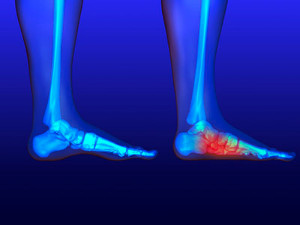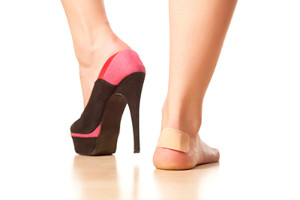
(616) 846-3400
Fax: (616) 846-3406

(616) 846-3400
Fax: (616) 846-3406
 The medical condition that is referred to as flat feet is also known as fallen or collapsed arches. This can occur as a result of an injury that has happened to the foot, genetic factors, or medical reasons that may include arthritis or pregnancy. Patients may experience pain and discomfort as a result of having this ailment, and it may affect the overall alignment of the body. Research has indicated there are stretches that can be performed which may be helpful in strengthening the feet. An effective way to stretch the heel is to extend one leg behind the other. As the heels are pressing into the floor, the heels and Achilles tendon are stretched. Some patients also find that it helps to roll their feet on top of a tennis or golf ball. This may help to stretch and strengthen the plantar fascia. If you have flat feet and would like additional information about how to perform stretches, please consult with a podiatrist.
The medical condition that is referred to as flat feet is also known as fallen or collapsed arches. This can occur as a result of an injury that has happened to the foot, genetic factors, or medical reasons that may include arthritis or pregnancy. Patients may experience pain and discomfort as a result of having this ailment, and it may affect the overall alignment of the body. Research has indicated there are stretches that can be performed which may be helpful in strengthening the feet. An effective way to stretch the heel is to extend one leg behind the other. As the heels are pressing into the floor, the heels and Achilles tendon are stretched. Some patients also find that it helps to roll their feet on top of a tennis or golf ball. This may help to stretch and strengthen the plantar fascia. If you have flat feet and would like additional information about how to perform stretches, please consult with a podiatrist.
Flatfoot is a condition many people suffer from. If you have flat feet, contact Dr. Robbi Young from Grand Haven Foot & Ankle. Our doctor will treat your foot and ankle needs.
What Are Flat Feet?
Flatfoot is a condition in which the arch of the foot is depressed and the sole of the foot is almost completely in contact with the ground. About 20-30% of the population generally has flat feet because their arches never formed during growth.
Conditions & Problems:
Having flat feet makes it difficult to run or walk because of the stress placed on the ankles.
Alignment – The general alignment of your legs can be disrupted, because the ankles move inward which can cause major discomfort.
Knees – If you have complications with your knees, flat feet can be a contributor to arthritis in that area.
Symptoms
Treatment
If you are experiencing pain and stress on the foot you may weaken the posterior tibial tendon, which runs around the inside of the ankle.
If you have any questions please feel free to contact our office located in Grand Haven, MI . We offer the newest diagnostic and treatment technologies for all your foot and ankle needs.
 If you frequently wear high heels, you may be prone to having sore and aching feet. This may be a result of the unnatural position the feet are in while wearing these types of shoes. There may be specific foot conditions that can develop from wearing high heels. These can include ingrown toenails and hammertoes, which can happen if there is a limited amount of room for the toes to move freely in. Additionally, it may be easier to fall, which may cause an ankle injury. If you choose to wear high heels, it may be beneficial to alternate days by wearing shoes with a lower heel. Research has indicated it may be beneficial to perform gentle stretches, which may help to strengthen the calves and to keep the feet strong. If you would like additional information about the possible dangers high heels can have on the feet, please consult with a podiatrist.
If you frequently wear high heels, you may be prone to having sore and aching feet. This may be a result of the unnatural position the feet are in while wearing these types of shoes. There may be specific foot conditions that can develop from wearing high heels. These can include ingrown toenails and hammertoes, which can happen if there is a limited amount of room for the toes to move freely in. Additionally, it may be easier to fall, which may cause an ankle injury. If you choose to wear high heels, it may be beneficial to alternate days by wearing shoes with a lower heel. Research has indicated it may be beneficial to perform gentle stretches, which may help to strengthen the calves and to keep the feet strong. If you would like additional information about the possible dangers high heels can have on the feet, please consult with a podiatrist.
High heels have a history of causing foot and ankle problems. If you have any concerns about your feet or ankles, contact Dr. Robbi Young from Grand Haven Foot & Ankle. Our doctor can provide the care you need to keep you pain-free and on your feet.
Effects of High Heels on the Feet
High heels are popular shoes among women because of their many styles and societal appeal. Despite this, high heels can still cause many health problems if worn too frequently.
Which Parts of My Body Will Be Affected by High Heels?
What Kinds of Foot Problems Can Develop from Wearing High Heels?
How Can I Still Wear High Heels and Maintain Foot Health?
If you want to wear high heeled shoes, make sure that you are not wearing them every day, as this will help prevent long term physical problems. Try wearing thicker heels as opposed to stilettos to distribute weight more evenly across the feet. Always make sure you are wearing the proper shoes for the right occasion, such as sneakers for exercising. If you walk to work, try carrying your heels with you and changing into them once you arrive at work. Adding inserts to your heels can help cushion your feet and absorb shock. Full foot inserts or metatarsal pads are available.
If you have any questions please feel free to contact our office located in Grand Haven, MI . We offer the newest diagnostic and treatment technologies for all your foot and ankle needs.